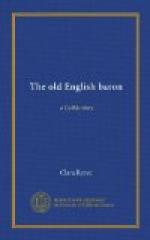Lord Clifford was desirous to know the grounds of the quarrel; but Sir Philip declined entering into particulars at present, assuring him of a full information hereafter. He then sent M. Zadisky, attended by John Wyatt, and a servant of Lord Clifford, with a letter to Lord Lovel; the contents were as follow:—
“My Lord Lovel,—“Sir Philip Harclay earnestly desires to see you at the house of Lord Clifford, where he waits to call you to account for the injuries done by you to the late Arthur Lord Lovel, your kinsman; If you accept his demand, he will make the Lord Clifford a witness and a judge of the cause; if not, he will expose you publicly as a traitor and a coward. Please to answer this letter, and he will acquaint you with the time, place, and manner of the meeting.
PhilipHarclay.”
Zadisky presented the letter to Lord Lovel, informing him that he was the friend of Sir Philip Harclay. He seemed surprised and confounded at the contents; but, putting on an haughty air, " I know nothing,” said he, “of the business this letter hints at; but wait a few hours, and I will give you an answer.” He gave orders to treat Zadisky as a gentleman in every respect, except in avoiding his company; for the Greek had a shrewd and penetrating aspect, and he observed every turn of his countenance. The next day he came and apologized for his absence, and gave him the answer; sending his respects to the Lord Clifford. The messengers returned with all speed, and Sir Philip read the answer before all present.
“Lord Lovel knows not of any injuries done by
him to the late Arthur Lord Lovel, whom he succeeded
by just right of inheritance; nor of any right Sir
Philip Harclay has, to call to account a man to whom
he is barely known, having seen him only once, many
years ago, at the house of his uncle, the old Lord
Lovel: Nevertheless, Lord Lovel will not suffer
any man to call his name and honour into question with
impunity; for which reason he will meet Sir Philip
Harclay at any time, place, and in what manner he
shall appoint, bringing the same number of friends
and dependents, that justice may be done to all parties.
Lovel.”
“’Tis well,” said Sir Philip; “I am glad to find he has the spirit to meet me; he is an enemy worthy of my sword.”
Lord Clifford then proposed that both parties should pass the borders, and obtain leave of the warden of the Scottish marches to decide the quarrel in his jurisdiction, with a select number of friends on both sides. Sir Philip agreed to the proposal; and Lord Clifford wrote in his own name to ask permission of the Lord Graham, that his friends might come there; and obtained it, on condition that neither party should exceed a limited number of friends and followers.
Lord Clifford sent chosen messengers to Lord Lovel, acquainting him with the conditions, and appointing the time, place, and manner of their meeting, and that he had been desired to accept the office of judge of the field. Lord Lovel accepted the conditions, and promised to be there without fail. Lord Clifford notified the same to Lord Graham, warden of the marches, who caused a piece of ground to be inclosed for the lists, and made preparations against the day appointed.




